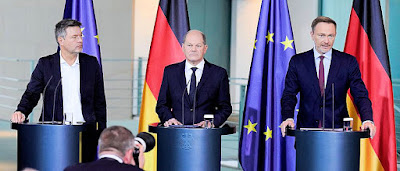|
In dulci jubilo, |
In sweet jubilation, now sing and be joyous! Our heart's bliss rests in a manger and shines like the sun in his mother's lap. You are the alpha and omega. |
... or in art:

|
| Carlo Maratta (1625-1713): The Holy Night |

|
|
Nativity in the vestibule of Freiburg's Minster Church. While Mary
presents the child to the shepherds, Joseph sits next to the manger as a grumpy old man with his head in his hands. |
The one exception is the Nativity by Hans Baldung Grien. Looking at Joseph's white beard, there is no doubt that he isn't the father, but as a late satisfaction, he dominates the painting alone with his red coat.
In the nativity scene in a stained glass window in Freiburg's Minster Church, Joseph once more is pushed to the edge of the picture, but he makes himself useful by slapping the ox's mouth as it nibbles on Jesus' diaper.
But the nativity was not all glory when we read Luke 2, 16-19:
And the shepherds came with haste and found Mary, Joseph, and the babe
lying in a manger. And when they had seen it, they made known abroad the
saying which was told them concerning this child. And all they that heard it
wondered at those things which were told them by the shepherds. But Mary
kept all these things and pondered them in her heart.
Those pondered things may explain some of the Nativity scenes where
both Mary and Joseph show great sadness:

|
| Basilica di San Marco in Venice. North façade of St. Mark's Basilica, Venice |

|
| Nativity from the Book of Hours, Paris 1410 |
Luke 2 34-35:
And Simeon blessed them, and said unto Mary his mother, Behold, this child
is set for the fall and rising again of many in Israel; and for a sign which
shall be spoken against; Yea, a sword shall pierce through thy own soul
also, that the thoughts of many hearts may be revealed.
The question is: Did the artists who created the above Nativities assume that
Mary already knew in Bethlehem the prophecy Simeon had made in the temple of
Jerusalem?
So it was not all in dulci jubilo in Bethlehem 2000 years
ago, and this Christmas, with two wars waging, only a few people feel like
singing and being joyous.
With this in mind, I wish all my readers a Merry Christmas and a Happy
New Year!
*
























































